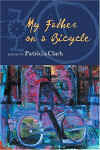|
|
Featured Book

click book
My Father on a Bicycle
If you ever saw my father in shorts,
you wouldn't forget his stick-thin legs,
the knees knobby as windfall dwarf apples.
And the only time I saw him ride a bike,
Oakes Street, I think, he pedaled "no hands"
down the street to show me the stance.
He wasn't a runner either, though he'd move
at a quick trot when trouble came to our door—
usually when the twins caught somebody's wrath.
Once they set an oatgrass field on fire, and trucks
came, red and furious down the boulevard.
Another time, after a morning of water-fat balloons
lobbed at cars, the cops shadowed Our porch.
Our father was an ambler, a stroller, a tall stander.
I can see him, heron-alert, bare-headed,
the waters of the Satsop or Nooksack, the cold
Chehalis, up past his knees, casting a line
among boulders, deadwood, and drop-offs.
Deep, moving water his abiding friend.
White Sweet Clover and All the Other Named and Unnamed
Flowers
White campion, first, for being ubiquitous
and fetching, its puffy calyxes
like the thoraxes of bees, plump, pendant.
And another pale one-wood anemone
with its opposite leaves, deeply palmate,
above which the flowers look creamy, shy;
Field clover, red, and the white sweet one,
too. Does the metalmark find it by scent?
Fading now, almost finished for the season, the elegant
reclusive stalks of dame's rocket in three colors—
pink, white, lavender. The last has lasted
longest, color of the dusky hours, the hours
of sorrow and reflection, of missing someone dear,
of words said that cannot be taken back.
A purple twining one, relative to the sweet pea,
which is called crown vetch. It adds
nitrogen to the soil and makes a stunning
companion along the roadside. Daily you fill in
one more name on the family tree, daily a new one
blooms. Soothing, idle purposes, oh summer.
Inflorescence: Fennel
Airy green stalk that raises
a compound umbel, seeded
and gold, as it grows.
What footing hides,
darkly; underground?
I neglected it for weeks,
till it tipped, rain—
battered, spindly; trying
to grow sideways. Only then
did I bring out stakes
:and twine. Before first
frost, I'll carry out
a spade from its hook
in the garden shed, then dig up
the striated greenish-white
root. Time, one fall
night, to prepare whole
baked trout on a bed
of Roma tomatoes, sliced
and seeded, with carrot, garlic, oil,
fennel. Its skin crackles
brown, a faint rainbow
pentimento, and aromas rise,
like prayer, into the trout's
flesh. Imagine your length
laid upon something else,
a root and stem pulled
from the ground, transformed
by a rich, thick steam.
Praise to the dark caverns
of magic, ovens of earth
and houses, blending of all
things together, cuisine's
alchemy, art.
Riverside Ghazal
Most watery of all the trees, these willows
stand in water. Ice pools around the ankles of willows.
A tree's name should reveal its nature.
Salix babylonica: the first word is for willow.
Doesn't it sound stretchy and pliable?
Babylonica is for the weeping part of willow.
From a quotation in Psalms: by the rivers of Babylon
we wept. The people hung harps on willows.
The weight gave them a bent, permanent shape.
A girl flings her hair down, a young willow.
A golden color, like a shout, all the length
of the fronds. They light up the willow.
Nearby on the concrete ramp, an ice-filled boat
waits for the sun to unmoor it, sail it past the willows.
In the season of thaw, this ice giving way:
By the rivers of America, we wept these willows.
Invocation
I'm taking the drastic step of imploring the trees,
the forty-foot maple first and then the two
nearby copper beeches, russet-red sketches
of leaves above black branches. Next, I'll bend
a knee for Lake Annaghmakerrig and the hills
beyond, pastured or wooded. And for the fields
divided by hedgerows, by ditches, fields where
the foxes run, one last night with a magpie fledgling
trembling in its mouth. I stumbled onto a deer
frantic and caught in netting, its horns snagged,
and it threw itself round in a mad circle to be
uncaught. Affinity with a deer, who would think
it, yet I wanted it free-and myself, too.
Let us lift up, despite the rain, let us knock
and have open, the body's marrow, socket, heart.
Patricia Clark, author of North of
Wondering, won the first book award from Women in Literature Press.
She is also the co-editor of Worlds in our Words: An Anthology of Contemporary
American Women Writers. At present, she teaches creative writing at Grand
Valley State University, where she is Professor in the Department of wRiting and the
university's poet-in-residence. Her work has been published in The Atlantic
Monthly, Gulf Coast, Iris, Slate, ForPoetry.com, Poetry Magazine and in many more
journals.
Patricia Clark's latest book of poems, My Father on a Bicycle, is published by
Michigan State University Press 2005. The
above poems are re-published from My Father on a Bicycle.
ForPoetry
|
